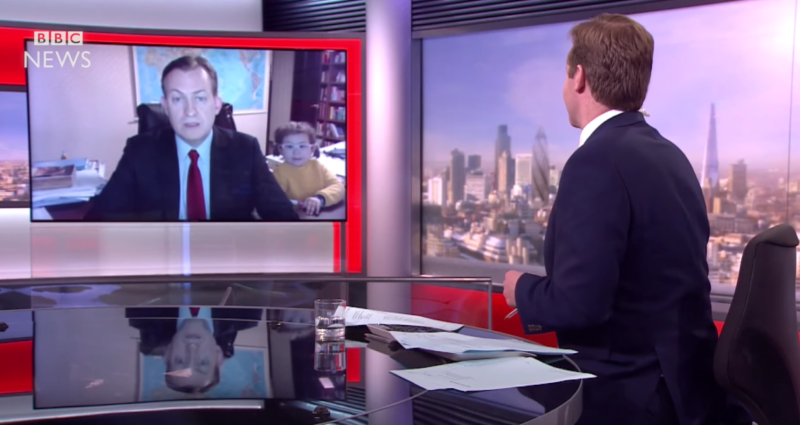Embrace the chaos – success doesn’t mean being a eunuch in a suit
In this guest post, marketer Cathie McGinn argues that the professional world has more to learn from the happy toddler in the BBC blooper than her stressed dad in his suit
Last week a man had a bad day at work. Trying his hardest to interpret a complex political situation on international television, he is interrupted by his adorable children. A momentary embarrassment. But it’s caught the attention and the imagination of the connected world.

Not only was the story of Korea expert Prof Robert Kelly covered by every major media outlet in the world, it has spawned a bewildering array of think pieces (and here’s another!) on what the video reveals about everything from racism, the patriarchy and the thanklessness of working in academia, to child abuse. There are memes, parodies, tweets. First we loved it, and the inevitable backlash followed swiftly.


Best opinion piece on mumbrella….ever.
Agree Adam, so agree. Here’s to real life. Loosening the suit might even make us better at our jobs.
Superb scribbling.
Terrific piece. Share broadly, people.
Ah, you clever lady. Thank you.
Made me smile.. thank you for this
Through the years I have learned that the people who dress in a suit and tie to do business are the ones that I avoid doing business with.
‘Dad, I’m considering a career in organised crime!’
– ”Government or private sector?’
Wonderful, positive words about what shouldn’t be a divisive moment!
In a follow up interview alongside his wife, he mentioned he was wearing pants. Although they could have been trakkies.
Yep… Nup.
This was an expert discussing the impeachment and ousting of the South Korean President, in the midst of North Korea’s (seemingly) escalating aggression. I need the commentary to be on point. I don’t care about the commenter’s familial circumstances, I only care about their expertise in the matter at hand.
You couldn’t script and direct this scene for funnier. The jaunty walk, the punchline upon punchline of the second child’s entrance… I haven’t laughed so genuinely in quite a while.
But this sort of intrusion on my news would soon get tired.
I don’t think anyone is suggesting that this happens frequently, but rather that when it does, we should embrace it.
@Hmmm. Don’t know which article you were reading, but I was reading the one about the professor who was called a eunuch and a fraud. Because he wore a suit and tie and was trying to focus on delivering his opinion in a professional manner.
Great article and a wonderful avenue to take off the video. The veil between the professional and the person is far less apparent in our industry I believe. But when you look at corporations and politics there is undoubtedly the belief that the more real you are as a person then the weaker you are as a professional. When of course the exact opposite is true.
No need to analyse guys. It’s simply something we all know. Don’t make a big deal about it.
Terrific column, Cathie. And as someone in a mixed-race family who immediately spotted the kids were halfies and the woman was obviously the mum and not the nanny or mail order, it’s nice someone else noticed the elephant that also bounded into the room.
Thought this was going to be another cliched article on “what marketing can learn from….” Left with a new perspective on ‘bringing yourself to work’. Good read. Thank you.
https://www.youtube.com/watch?v=PLMSoD1riE0
Thanks “And This” – I’ve added that updated interview with the family into Cathie’s piece.
Cheers,
Tim – Mumbrella
There is nothing wrong with his tie and there is nothing wrong with owning books and displaying them for the world to see. – Burgundy Tie Owner.
There are thousands of people who are constrained each day by the required dress code including ties and suits and they don’t enjoy it. They don’t have the freedom to wear ironic t-shirts and faces of tragic stubble along with thongs and jeans….that’s just inside the ad industry bubble. If they work from home like this guy, you dress as expected. I’ve had many a skype meeting at home wearing board shorts but dressed in many kinds of clothing up top to suit the occasion. On very few occasions a suit and tie was appropriate. I’ve seen some dress in board rooms where the attendees could justifiably be asked to sit at the kiddies table rather than the board table. Getting the balance right whilst maintaining your own personal identity can be tricky but it is important.
brilliantly crafted coverage on a wonderful family doing its best in industry and at home
bless you all
Everyone knows that Tim Berners-Lee has never sought credit for inventing the internet, right?
Love the article Cathie and the sentiment about the different masks – too true. I love spending time with my little one every evening – mostly because it’s one of the few times during the working week when you can 100% relax, be silly, waddle like a duck and be entirely care free!
So well said.
Masks is the key here for me. We learn them early and according to gender. Great analysis thanks.
Cathie writes “relying on people in suits to interpret the world for us plebs …” She’s a journalist who “leads marketing and communications for the Australian College of Midwives : I’m puzzled as to how she identifies as a pleb. Anyway, nice piece .
That was so f*in good – BE MONKEY